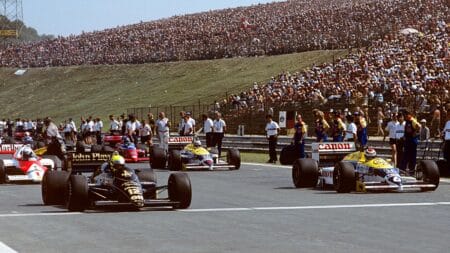All of a sudden the World Championship calendar is starting to look more than a little unbalanced – and, some would say, unstable. As of now, the 2009 schedule contains 17 races (two fewer than originally envisaged), and for the first time a majority of them will be run outside Formula 1’s cultural home, which, no matter what some might claim, has always been Europe.

We know why this has happened, of course. For a very long time Bernie Ecclestone was the ‘commercial rights holder’ in F1, and years ago bought them from the FIA for no fewer than 100 years for what most observers regarded as a derisorily small sum. No one needs to be reminded that Bernie likes to make a buck, but at least, while he owned the rights, he had the facility once in a while to do a deal with a race organiser that didn’t necessarily stack up financially, but was in the good interests of the sport and its competitors.
Since he sold the commercial rights to CVC Capital Partners, however, that situation has changed. To finance the deal, CVC had to borrow heavily – from the Royal Bank of Scotland, among others – and those loans are expensive to service. CVC did not get involved for reasons of altruism, and fundamentally couldn’t care less where the Grands Prix are run: all that matters is the bottom line, and inevitably that means more and more ultra-lucrative venues, where government backing is guaranteed. Bad news, of course, for Europe, which has the fans, the history and the heritage, but not the financial clout to compete.

As European races begin to disappear from the schedule, there is of course a risk that ultimately the fans will become disenchanted. Why did we have a ‘night race’ in Singapore? Because starting it at 8pm enabled it to be televised live at 1pm in Europe, a time convenient to TV viewers here. There will always be hardcore fans prepared to watch a race in the middle of the night, but not enough of them to please the TV companies, whose financial contribution to F1 is enormous.

The trend, therefore, is increasingly towards the East, Middle and Far. Already we have Bahrain, Australia, China, Japan, Malaysia and Singapore, and on the near horizon are Grands Prix in Abu Dhabi, India and South Korea.

Magny-Cours, France 1995. Damon Hill (Williams FW17 Renault) followed by Michael Schumacher (Benetton B195 Renault)
Given that Ecclestone has said that his intention is to stick with a maximum of 20 Grands Prix in a season, the influx of new countries necessarily means that some traditional ones will have to be shown the door. France has recently cancelled its 2009 race, citing the current economic situation as the reason, but next year’s would anyway have been the last Grand Prix at Magny-Cours. Another French venue may appear in time, but we shouldn’t hold our breath, and as far as the British Grand Prix is concerned, the ’09 race will be the last at Silverstone – the circuit which hosted the very first World Championship Grand Prix back in 1950. Will the race at Donington come to be reality? The F1 community has its doubts, let’s say.

1950 British Grand Prix at Silverstone. King George VI meets the drivers, including a young Stirling Moss in the foreground
Over time both Ecclestone and FIA president Max Mosley have endlessly stressed that something calling itself a World Championship should be just that – this was the reason given for expanding into Asia. But, that being so, is it not almost beyond belief that the 2009 calendar entirely bypasses a little continent called North America? This year we lost the US Grand Prix at Indianapolis, because Tony George was not prepared to keep pace with the new tariff of F1, as set by ‘government-funded’ events. That made the manufacturers – Mercedes, BMW, Honda, Toyota etc – extremely angry, for they quite like selling cars in the US.

1966 United States Grand Prix at Watkins Glen, New York. Jim Clark leads the field away
Now the Canadian Grand Prix, too, is gone, after more than 40 years on the schedule. Apparently the bill for the ’08 race has not – yet, anyway – been paid in full, and therefore the ’09 date has been lost. Once again the manufacturers are angry (to say nothing of the F1-mad Canadian fans), and it seems to me that it’s about time they did something with their anger, and put pressure on the powers-that-be. It is not only to the commercial rights holders that markets are important, after all.
As for the fans, well, as ever they get what they’re given, take it or leave it. And if increasing numbers, feeling ever more excluded, leave it, presumably the power brokers will consider that a price worth paying.










